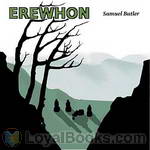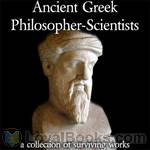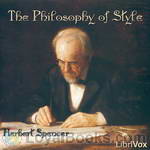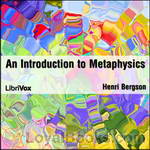|
Books Should Be Free Loyal Books Free Public Domain Audiobooks & eBook Downloads |
|
|
Books Should Be Free Loyal Books Free Public Domain Audiobooks & eBook Downloads |
|
Philosophy Books |
|---|
|
Book type:
Sort by:
View by:
|
By: Friedrich Nietzsche (1844-1900) | |
|---|---|
 Case of Wagner / Nietzsche Contra Wagner / Selected Aphorisms
Case of Wagner / Nietzsche Contra Wagner / Selected Aphorisms
A collection of three of Nietzsche's writings concerning the music of Wagner. In particular, he relates Wagner's music as degenerate, unrefined and unintelligent and relates it to a gradually degenerating German culture and society. The translator provides a detailed introduction. | |
By: Friedrich Wilhelm Nietzsche (1844-1900) | |
|---|---|
 Homer and Classical Philology
Homer and Classical Philology
| |
 We Philologists Complete Works of Friedrich Nietzsche, Volume 8
We Philologists Complete Works of Friedrich Nietzsche, Volume 8
| |
 Thoughts out of Season Part I
Thoughts out of Season Part I
| |
By: Samuel Butler (1835-1902) | |
|---|---|
 Erewhon
Erewhon
Erewhon, or Over the Range is a novel by Samuel Butler, published anonymously in 1872. The title is also the name of a country, supposedly discovered by the protagonist. In the novel, it is not revealed in which part of the world Erewhon is, but it is clear that it is a fictional country. Butler meant the title to be read as the word Nowhere backwards, even though the letters “h” and “w” are transposed. It is likely that he did this to protect himself from accusations of being unpatriotic, although Erewhon is obviously a satire of Victorian society. | |
 Erewhon Revisited
Erewhon Revisited
| |
 Selections from Previous Works and Remarks on Romanes' Mental Evolution in Animals
Selections from Previous Works and Remarks on Romanes' Mental Evolution in Animals
| |
By: Varous | |
|---|---|
 Ancient Greek Philosopher-Scientists
Ancient Greek Philosopher-Scientists
The Pre-Socratic Greek philosophers, that is, the philosopher-scientists who lived before or contemporaneously to Socrates, were the first men in the Western world to establish a line of inquiry regarding the natural phenomena that rejected the traditional religious explanations and searched for rational explanations. Even though they do not form a school of thought, they can be considered the fathers of philosophy and many other sciences as we have them now. None of their works is extant, so, in this collection, we present the textual fragments, when existing, of ten Pre-Socratic philosopher-scientists, and quotations and testimonials about them left by later authors... | |
By: Lucius Annaeus Seneca | |
|---|---|
 Of the Shortness of Life
Of the Shortness of Life
De Brevitate Vitae ("Of the Shortness of Life") is a moral essay written by Seneca the Younger, a Roman Stoic philosopher, to his friend Paulinus. The philosopher brings up many Stoic principles on the nature of time, namely that men waste much of it in meaningless pursuits. According to the essay, nature gives man enough time to do what is really important and the individual must allot it properly. In general, time can be best used in the study of philosophy, according to Seneca. | |
By: Martin Luther (1483-1546) | |
|---|---|
 Martin Luther's 95 Theses
Martin Luther's 95 Theses
| |
By: Nagarjuna | |
|---|---|
 She-rab Dong-bu (The Tree of Wisdom)
She-rab Dong-bu (The Tree of Wisdom)
The She-rab Dong-bu (Tree of Wisdom) is a metrical translation in Tibetan of a Sanscrit ethical work entitled Prajnya Danda, written by Nagarjuna who flourished in the fourth century of the Buddhist era (about 100 B.C.), The Tibetan version was probably made about the 11th century of our era but the exact date has not been determined. It is included in the Ten-gyur, ངོ་ section, volume གོ་, beginning at leaf 165. The Tibetan translator describes it as the second volume but I cannot say whether the remainder of the work has been preserved in Tibetan – the Sanscrit original is apparently lost. | |
By: Thomas Henry Huxley (1825-1895) | |
|---|---|
 Has a Frog a Soul?
Has a Frog a Soul?
Thomas Huxley, known as “Darwin’s Bulldog” for his championing and development of Darwinism, was perhaps the most important Victorian biologist after Darwin himself. This speech to the Metaphysical Society in 1870 is one of Huxley’s best known texts outside the sphere of his specialism, and remains read today by students of philosophy. In it, Huxley argues from the results of vivisection to metaphysics. | |
By: Rupert Brooke | |
|---|---|
 Collected Poems of Rupert Brooke
Collected Poems of Rupert Brooke
Rupert Chawner Brooke (August 3, 1887 – April 23, 1915) was an English poet known for his idealistic War Sonnets written during the First World War (especially The Soldier), as well as for his poetry written outside of war, especially The Old Vicarage, Grantchester and The Great Lover. He was also known for his boyish good looks, which prompted the Irish poet William Butler Yeats to describe him as “the handsomest young man in England”. | |
By: Niccolò Machiavelli (1469-1527) | |
|---|---|
 Machiavelli, Volume I
Machiavelli, Volume I
| |
By: Herbert Spencer (1820-1903) | |
|---|---|
 The Philosophy of Style
The Philosophy of Style
“The Philosophy of Style,” explored a growing trend of formalist approaches to writing. Highly focused on the proper placement and ordering of the parts of an English sentence, [Spencer] created a guide for effective composition. Spencer’s aim was to free prose writing from as much “friction and inertia” as possible, so that the reader would not be slowed by strenuous deliberations concerning the proper context and meaning of a sentence. | |
 Essays: Scientific, Political, & Speculative, Vol. I
Essays: Scientific, Political, & Speculative, Vol. I
| |
By: Charlotte Perkins Gilman (1860-1935) | |
|---|---|
 Herland
Herland
Herland is a utopian novel from 1915, written by feminist Charlotte Perkins Gilman. The book describes an isolated society comprised entirely of Aryan women who reproduce via parthenogenesis (asexual reproduction). The result is an ideal social order, free of war, conflict and domination. It first appeared as a serial in Perkin’s monthly magazine Forerunner. | |
By: Winston Churchill (1871-1947) | |
|---|---|
 The Inside of the Cup
The Inside of the Cup
| |
By: Henri Bergson (1859-1941) | |
|---|---|
 An Introduction to Metaphysics
An Introduction to Metaphysics
An Introduction to Metaphysics (Introduction a la Metaphysique) is a 1903 essay by Henri Bergson that explores the concept of reality. For Bergson, reality occurs not in a series of discrete states but as a process similar to that described by the Greek philosopher Heraclitus. Reality is fluid and cannot be completely understood through reductionistic analysis, which he said “implies that we go around an object”, gaining knowledge from various perspectives which are relative. Instead, reality can be grasped absolutely only through intuition, which Bergson expressed as “entering into” the object. | |
 Laughter : an Essay on the Meaning of the Comic
Laughter : an Essay on the Meaning of the Comic
| |
By: Marcus Tullius Cicero (106 BC - 43 BC) | |
|---|---|
 Academica
Academica
| |
 The Academic Questions, Treatise De Finibus, and Tusculan Disputations, of M.T. Cicero, With a Sketch of the Greek Philosophers Mentioned by Cicero
The Academic Questions, Treatise De Finibus, and Tusculan Disputations, of M.T. Cicero, With a Sketch of the Greek Philosophers Mentioned by Cicero
| |
By: Christopher Marlowe (1564-1593) | |
|---|---|
 The Jew of Malta
The Jew of Malta
Christopher “Kit” Marlowe (baptised 26 February 1564 – 30 May 1593) was an English dramatist, poet, and translator of the Elizabethan era. The foremost Elizabethan tragedian before William Shakespeare, he is known for his magnificent blank verse, his overreaching protagonists, and his own untimely death. The Jew of Malta (1589) is an original story of religious conflict, intrigue, and revenge, set against a backdrop of the struggle for supremacy between Spain and the Ottoman Empire in the Mediterranean... | |
By: William Walker Atkinson (1862-1932) | |
|---|---|
 Series of Lessons in Raja Yoga
Series of Lessons in Raja Yoga
The Book talks on the internal world of the self. The real nature of the subconscious mind, the way to control it, how ego comes into play and most frequently asked questions like "Who am I" are attempted to answer. | |
By: St. Teresa of Avila (1515-1582) | |
|---|---|
 Book of the Foundations
Book of the Foundations
Essentially the sequel to The Life of St. Teresa, Teresa recounts the foundations of the Discalced Carmelite monasteries in Spain, both for men and women. This book tells of all the triumphs and troubles, and about the many people who helped her.(Introduction by Ann Boulais) | |
By: Blaise Pascal | |
|---|---|
 Pensées
Pensées
Pascal’s Pensées is widely considered to be a masterpiece, and a landmark in French prose. When commenting on one particular section (Thought #72), Sainte-Beuve praised it as the finest pages in the French language. Will Durant, in his 11-volume, comprehensive The Story of Civilization series, hailed it as “the most eloquent book in French prose.” In Pensées, Pascal surveys several philosophical paradoxes: infinity and nothing, faith and reason, soul and matter, death and life, meaning and vanity—seemingly arriving at no definitive conclusions besides humility, ignorance, and grace. Rolling these into one he develops Pascal’s Wager. | |
 Pascal's Pensées
Pascal's Pensées
| |
By: Inazo Nitobe (1862-1933) | |
|---|---|
 Bushido: The Soul of Japan
Bushido: The Soul of Japan
Bushido: The Soul of Japan written by Inazo Nitobe was one of the first books on samurai ethics that was originally written in English for a Western audience, and has been subsequently translated into many other languages (also Japanese). Nitobe found in Bushido, the Way of the Warrior, the sources of the virtues most admired by his people: rectitude, courage, benevolence, politeness, sincerity, honor, loyalty and self-control, and he uses his deep knowledge of Western culture to draw comparisons with Medieval Chivalry, Philosophy, and Christianity. | |
By: Ludwig Wittgenstein (1889-1951) | |
|---|---|
 Tractatus Logico-Philosophicus
Tractatus Logico-Philosophicus
Tractatus Logico-Philosophicus is the only book-length philosophical work published by the Austrian philosopher Ludwig Wittgenstein during his lifetime. He wrote it as a soldier and a prisoner of war during World War I. The slim volume (fewer than eighty pages) comprises a system of short statements, numbered 1, 1.1, 1.11, 1.12, etc., through to 7, intended to be such that 1.1 is a comment on or elaboration of 1, 1.11 and 1.12 comments on 1.1, and so forth. It is an ambitious project to identify the relationship between language and reality and to define the limits of science. | |
By: Jeremy Bentham (1748-1832) | |
|---|---|
 Offences Against One's Self: Paederasty
Offences Against One's Self: Paederasty
Jeremy Bentham (1748-1832) was an English jurist, philosopher, and legal and social reformer. He was a political radical and a leading theorist in Anglo-American philosophy of law. He is best known as an early advocate of utilitarianism and animal rights who influenced the development of liberalism. The essay Offences Against One’s Self (c. 1785), argued for the liberalisation of laws prohibiting homosexuality. The essay remained unpublished during Bentham’s lifetime for fear of offending public morality... | |
 An Introduction to the Principles of Morals and Legislation
An Introduction to the Principles of Morals and Legislation
Jeremy Bentham's Introduction to the Principles of Morals and Legislation, a classic text in modern philosophy and jurisprudence, first published in 1789, focuses on the principle of utility and how this view of morality ties into legislative practices. Bentham's ambition in life was to create a complete Utilitarian code of law. The philosophy of utilitarianism argues that the right act or policy is that which would cause "the greatest good for the greatest number of people", also known as "the greatest happiness principle", or the principle of utility... | |
By: Alfred North Whitehead (1861-1947) | |
|---|---|
 The Concept of Nature
The Concept of Nature
In The Concept of Nature, Alfred North Whitehead discusses the interrelatedness of time, space, and human perception.The idea of objects as ‘occasions of experience’, arguments against body-mind duality and the search for an all-encompassing ‘philosophy of nature’ are examined, with specific reference to contemporary (Einstein, with whose theory of relativity he has some complaints) and ancient (Plato, Aristotle) approaches. | |